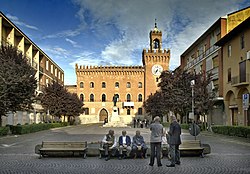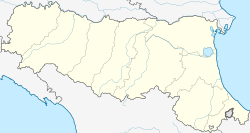Budrio (Eastern Bolognese: Bûdri) is a town and comune in the Metropolitan City of Bologna, in Emilia-Romagna, Italy; it is 15 kilometres (9 mi) east of Bologna.
Budrio | |
|---|---|
| Comune di Budrio | |
 Piazza Quirico Filopanti with the town hall in the background. | |
| Coordinates: 44°33′N 11°32′E / 44.550°N 11.533°E | |
| Country | Italy |
| Region | Emilia-Romagna |
| Metropolitan city | Bologna (BO) |
| Frazioni | Armarolo, Bagnarola, Cento, Dugliolo, Maddalena di Cazzano, Mezzolara, Prunaro, Riccardina, Vedrana, Vigorso |
| Government | |
| • Mayor | Maurizio Mazzanti |
| Area | |
• Total | 120.19 km2 (46.41 sq mi) |
| Elevation | 26 m (85 ft) |
| Population (28 February 2017)[2] | |
• Total | 18,479 |
| • Density | 150/km2 (400/sq mi) |
| Demonym | Budriesi |
| Time zone | UTC+1 (CET) |
| • Summer (DST) | UTC+2 (CEST) |
| Postal code | 40054 |
| Dialing code | 051 |
| Patron saint | St. Lawrence |
| Saint day | August 10 |
| Website | Official website |
Budrio is the birthplace of Giuseppe Barilli, better known under his pseudonym of Quirico Filopanti, an Italian mathematician and politician.
History
editThe area around Burdio was a Roman colony, whose territory was divided between veteran legionaries. The current town was however founded in the 10th-11th centuries AD. The church of San Lorenzo was already active in 1146. In the 14th century Cardinal Gil de Albornoz rebuilt it as a castle, of which the two large towers (1376) can still be seen, while of the walls only a small section remains.
Main sights
editThe most notable attraction are the Bentivoglio castle (16th century) and the Villa Ranuzzi Cospi at Bagnarola. The town also houses an art gallery- Pinacoteca Domenico Inzaghi- and the churches of San Domenico del Rosario, San Lorenzo, and Santi Gervasio e Protasio.
Notable people
edit- Valeria Buldini, model
- Giuseppe Donati, inventor of the ocarina
- Pierpaolo Donati, sociologist and philosopher of social science
- Quirico Filopanti, mathematician and politician
- Gustavo Fiorini, retired footballer
- Marcello Massarenti, papal almoner (Vatican official)
- Prospero Sarti, engineer, architect, engraver, and collector of antiquities[3]
Sister cities
editReferences
edit- ^ "Superficie di Comuni Province e Regioni italiane al 9 ottobre 2011". Italian National Institute of Statistics. Retrieved 16 March 2019.
- ^ ISTAT Archived March 3, 2016, at the Wayback Machine
- ^ Dizionario degli Artisti Italiani Viventi: pittori, scultori, e Architetti, by Angelo de Gubernatis. Tipe dei Successori Le Monnier, 1889, page 455.
External links
edit


